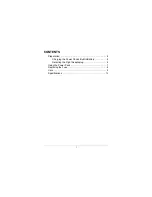
AJUSTEMENTS & OPÉRATIONS
LOCKING CHUCK AT DESIRED DEPTH
1. With the switch off, loosen the depth scale lock.
2. Turn the feed handles until the chuck is at the desired height. Hold the
feed handles at this position.
3. Turn the depth scale clockwise until it stops.
4. Tighten the depth scale lock.
5. The chuck will now be held at the depth when the feed handles are
released.
BASIC DRILL PRESS OPERATIONS
INSTALLING DRILL BITS
Insert drill bit into chuck far enough to obtain maximum gripping of the
chuck jaws (fig.23). The jaws are approximately 1” long. When using a
small drill bit, do not insert it so far that the jaws touch the flutes (spiral
grooves) of the drill bit. Make sure the drill bit is centered in the chuck
before tightening the chuck with the key.
Tighten the drill bit sufficiently, so that it does not slip while drilling. Turn
the chuck key clockwise to tighten, counterclockwise to loosen.
POSITIONNING THE TABLE AND WORKPIECE
Lock the table to the column in a position so that the tip of the drill bit is
just a little above the top of the workpiece.
Always place backup material (wood, plywood...) on the table underneath
the workpiece. This will prevent “splintering” or making a heavy burr on
the underside of the workpiece as the drill bit breaks through. To keep the
backup material from spinning out of control, it must contact the left side
of the column, as illustrated in fig.24.
WARNING!
If the backup material is not long enough to reach the left
side of the column, clamp it to the table. Failure to do this could result in
personnal injury.
For small workpieces that can’t be clamp to the table, use a drill press vise
(optional accessory) (Fig.25). See authorized KING CANADA retailer for
more information on purchasing drill press vises.
WARNING!
The vise must be clamped or bolted to the table to reduce the
risk of injury from spinning work or vise or tool breakage.
Depth scale lock
FIGURE 22
Depth scale
Adjust to
desired depth
FIGURE 23
Chuck key
Chuck
Jaws
FIGURE 24
Workpiece
Backup
material
Workpiece
Bolt or clamp vise securely
Drill press
vise
FIGURE 25

































